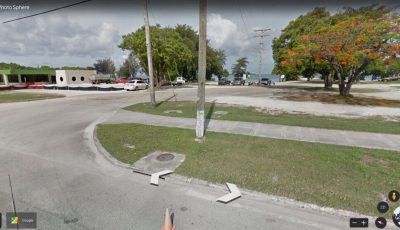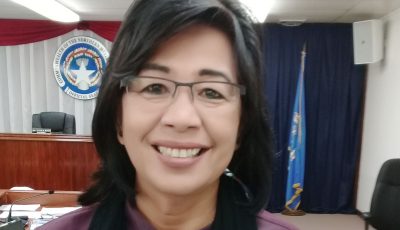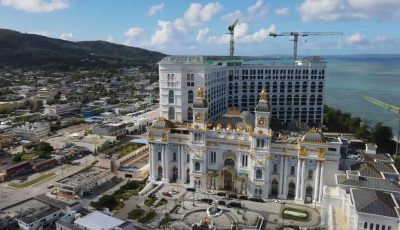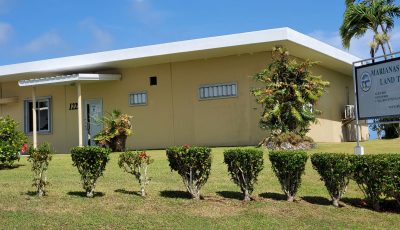Leepan calls AG opinion on advisory board ‘soft wet pampers’
Rep. Joseph Leepan Guerrero (R-Saipan) strongly disagrees with Attorney General Edward Manibusan’s position that the Department of Public Lands advisory board needs a full five-member majority, rather than the appointed four, to conduct meetings with the DPL secretary, saying that the law was silent on this issue and a four-member majority was sufficient to proceed per Robert rules of order.
Guerrero expressed his thoughts during House of Representatives Committee on Natural Resources meeting on Thursday morning, where lawmakers also later moved on a bill to abolish DPL and replace it with a “Marianas Lands Corporation,” recommending House Bill 19-82’s passage in the full House, Saipan Tribune learned.
“There is a hidden agenda. They don’t want an advisory board,” Guerrero said during discussion.
Guerrero described an amendment he offered on the bill “would be in respect to the advisory board” and “give them the benefit of the doubt to work with the secretary.”
House counsel John Cool, during discussion, also indicated that a majority of four could proceed with organization and appoint a chairman. The AG’s reasoning—if one were to follow it—would mean that if five members were appointed and one was absent, “they would have to wait to act on pressing matter,” Cool said.
“That’s the most stupidest opinion I’ve heard in my life,” Guerrero said.
Cool said DPL is the only agency in the entire Commonwealth government that functions that way. “We don’t have a problem with CDA, we don’t have a problem with SHEFA. We have a vacant position [and] it’s still a majority…This is the only board that the AG—or someone—has taken the position that you have to have” five members, he said. But with other boards “similar to the advisory board. They don’t have a problem.”
Rep. Felicidad Ogumoro (R-Saipan) asked if the law “is clear” that they have to do it that way.
Cool said “the language that is used to create [the advisory board is used] for almost every other Commonwealth board…but this is the only board where the AG has raised this” issue. Following this logic, Cool said, every time there would be a vacancy at the CDA or the CPA board they would not be able to meet until they fill up the vacant seat.
The AG’s opinion/interpretation is “a soft wet pampers,” Guerrero said. “That’s how I would interpret it.”
The law does not say the five board members constitute a quorum, Guerrero said. He added, citing the Robert rules, four members would constitute a quorum. “Let them organize,” he said.
AG opinion
In an April 4 opinion, Manibusan was responding for a request from DPL Secretary Marianne Teregeyo for guidance on the responsibilities of the Public Lands advisory board, its timing and organization of meetings, the applicability of the Open Government Meetings and Records Act on the board, the board’s advisory role, as well as the budget and expenditure authority with respect to the board.
Manibusan, in summary, said the board is an advisory body is limited to DPL’s comprehensive land use plan and homestead programs.
“Its members serve without compensation. This advisory board is not a governing entity. It is not subject to the Commonwealth’s Open Government Meetings and Records Act. As an advisory body, the board has no expenditure authority” over DPL funds, the AG said.
Citing the public law that established DPL, the AG said that while the law dictates “how” the board will be established—with four members appointed by mayors and one by the governor—the provision is “not self-executing” because it “requires the appointment of members by five different authorities.”
“Until all five appointments are made, the mandate…has not been fully executed” and “no advisory board has been established” according to law, he said, and therefore, meetings cannot be called “until a fight and final member is appointed.”
Proposed agenda
Advisory board members had sent a proposed agenda to Teregeyo last month that included a selection of officers, standing committees, and a 12-month board meeting calendar.
The proposed agenda also tasked reports from the DPL’s secretary’s “vision, priority and performance timeline,” scheduling of public hearings on outstanding homestead issues, and scheduling of a presentation by the DPL on its establishing law, current and future projects, fiscal year budget, financial status, and its organization composition, among others.
In a March 28 letter to the appointed board members, Teregeyo said absent quorum requirements in their establishing law, there was “no authorization” for the board to “meet with fewer than full membership.”
She said DPL’s establish law “limits your role” to major issues affecting the management of public lands like DPL’s land use plan and homestead program.
“Your proposed agenda venture far past advice and well into that of oversight. Specifically, an advisory board has no authority to call public meetings or demand briefings from the department,” she added.
Teregeyo also cited legislative records, or committee reports, prepared in establishing the advisory board. These stated that the law would “establish an advisory board, but limit its functions to advising, rather than controlling, the secretary…”



























